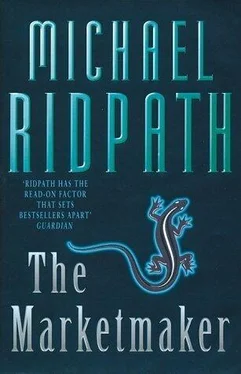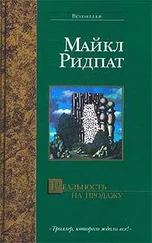I still didn’t know what to do about that. I wished I’d had a chance to discuss it with Jamie before I’d left. It seemed very likely that money was being laundered at Dekker Trust. Whether Ricardo and Eduardo knew that, I had no idea. But I also had no idea what it had got to do with me. My instincts told me to ignore it, at least until I got my bearings at Dekker. It could safely wait until I returned.
There was a knock at the door. It was Isabel.
‘Come in,’ I said. ‘Do you want a beer?’
She shook her head. I wandered back out to the balcony and she followed me.
‘This is amazing,’ I said.
‘Rio is beautiful,’ she said, matter-of-factly. ‘And if you work for Dekker, you tend to end up in the nicest hotel rooms.’
She was wearing a simple black summer dress. She leaned back against the railing of my balcony. My throat went dry. I had another swig of beer.
‘I tried to get hold of Jack Langton, my contact at the WDF, but no luck,’ she said. ‘I’ve left a message for him to call me tomorrow at the Ministry of Finance.’
‘OK.’
‘I’m going to dinner with some old friends tonight. Will you be all right here by yourself?’
‘I’ll be fine.’
‘If you do go out, don’t carry much money with you, and if anyone asks you for it, just give it to them.’
‘Yes, Mum.’
She smiled and blushed. ‘I’m sorry, but this town can be dangerous for strangers.’
‘That’s OK. Don’t worry, I’ll be careful.’
She moved to leave and then hesitated. ‘I’m having lunch with my father on Saturday. Would you like to come? He’s always enjoyed reading Russian novels. I think he’d like to meet you.’
I tried to hide my surprise. ‘Thank you very much.’
‘Good,’ she said, and was gone.
I sat and watched evening descend upon the beach. Then I grabbed a few reais and joined the evening promenade along the Avenida Atlântica.
The meetings with the rating agencies on Friday went well. They seemed to be satisfied that everything hung together. The only slight worry was that we didn’t hear from the WDF. So during a break for lunch Isabel called them, and discovered that Jack Langton was out all day and would call back on Monday.
On Saturday morning I called Pedro Hattori at the office, on the off-chance he was in. He was. My Argentine Discounts were down a point following an unsubstantiated rumour of a general strike the following week. Pedro told me not to worry, there was nothing in it. But I did.
I spent the morning exploring Rio. It overwhelmed my senses. It was an extraordinary city, physically the most beautiful I had ever seen. It was an absurd mix of sea, beach, forest and mountain, all four in such close proximity that it seemed impossible to fit a city in among them. Everywhere you went there seemed to be a beach in front of you and a mountain behind. The buildings themselves were nothing special, anything old in Rio was run down and shabby, but even the starkest modern building was overwhelmed by the beauty surrounding it.
I returned to the hotel at one o’clock to meet Isabel. We jumped into a taxi to Ipanema where her father lived. Ipanema beach was subtly different from Copacabana. It had the same white sand, and it was surrounded by similar lush green mountains, but the apartment buildings seemed newer and better kept, and the beach-goers were different, more relaxed. Phone booths like giant motor-cycle helmets in yellow and orange sprouted up in clusters every hundred yards or so. In most of them girls in shorts and bikini tops laughed and chatted. On my walk the other night along Copacabana the girls had looked like hookers; here they looked like middle-class schoolgirls fixing up the day’s entertainment on the beach. Ipanema had sun, sea, sand, and money.
But, at the far end of the beach, behind a rectangular hotel, I could see a jumble of small buildings, little square boxes clinging to the edge of a mountain, looking at any moment as if they would tumble into the sea below. They were packed tightly together, no line was quite straight, no building quite complete. A favela.
‘It’s extraordinary to see the two so close together,’ I said. ‘The rich and the poor. It’s almost obscene.’
‘It is obscene,’ replied Isabel.
We pulled up a side-street and stopped outside some iron gates adorned with a small video camera and an electronic combination lock. Above us rose a sand-coloured apartment building. The gates whirred and opened, and the taxi drove us up to the black smoked-glass entrance.
We walked into a cool lobby, and a uniformed doorman greeted Isabel with a grin. A boy, also in uniform, ushered us into a wood-panelled lift, and we headed up to the fifteenth floor. The doors opened, into a hallway.
‘Isabel!’ a deep voice cried. A tall middle-aged man with a slight stoop stood waiting for us. He opened out his arms.
‘Papai,’ she said, and gave him a hug.
Isabel’s father had her long Roman nose, which on him looked distinguished. He peered at me over the half-moon glasses.
‘I’m Luís. Welcome.’ He shook my hand and smiled. He was very tall. Even with the stoop I had to look up at him, and I’m six foot three. His hair was still black, but was thinning. He had a good-humoured face, wrinkled by sun and laughter. ‘Come through, come through.’
He led us in to a large living room. The furniture was low, and either of dark wood or cane. Bright colourful paintings covered the walls on large canvases. The sun streamed in from big windows that looked out on to a balcony. Beyond that stretched the shimmering blue sea.
Suddenly there was a clattering sound followed by heavy thumping from the hallway behind us. ‘Isabel!’ screamed a hoarse voice, and a large black woman wearing a dark uniform and an apron charged into the room. She grabbed Isabel and kissed her hard on both cheeks, breathing deeply from the exertion of her gallop. Isabel beamed and spoke to the big woman rapidly. They exchanged laughs and hasty comments, and then the woman caught sight of me. She whispered something that made Isabel blush, and turn and hit her playfully on the shoulder.
‘Maria has been my maid since I was a little girl,’ Isabel said. ‘She still thinks she can tell me what to do.’
I held out my hand to her. ‘Tudo bem?’ I said, using up fifty per cent of my Portuguese vocabulary. Maria’s grin somehow widened further, and she regaled me with a torrent of Portuguese. I settled on ‘Obrigado’ or ‘Thank you’ as an answer, which sent her into hysterics.
Luís looked on in amusement. ‘Can I get you a drink? Have you tried a caipirinha yet?’
‘Not yet.’
‘Well, then, you must try one now.’ He spoke quickly to another maid who was hovering at the door, and she disappeared.
Luís led us out on to the balcony. Although the table and chairs were in the shade, the glare of the midday sun reflecting off the nearby white buildings hurt my eyes. We could look over them, to Ipanema Bay, an astonishing blue, dotted with lush green islands. Brightly coloured tropical flowers spilled out of tubs on the terrace, and a bougainvillaea, in full purple bloom, framed the view. The gentle murmur of traffic, sea and people drifted up to us on the breeze. Directly beneath us were a couple of tennis courts and a swimming pool in a green compound. A private club, presumably.
The maid returned with the drinks. The caipirinha turned out to be some kind of coarse rum in lime juice. The sweetness of rum, the sourness of lime juice, the coldness of the ice, and the kick of alcohol created a delicious mix of sensations.
Luís was watching me and smiled. ‘How do you like it?’
‘It goes down very well.’
Читать дальше












